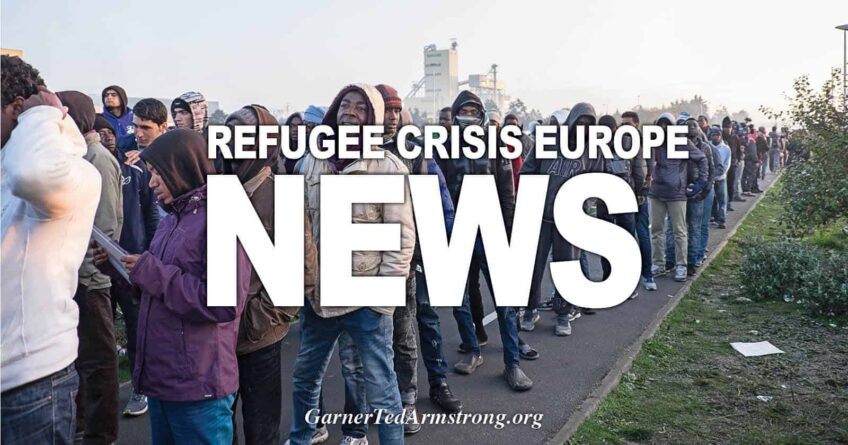The drones, previously deployed in Afghanistan, were built in a joint venture by Israeli and British defense contractors. The aircraft are joining other military assets in the skies over the Channel, including the Royal Air Force’s Shadow R1, designed to bring “battle-winning knowledge and effect to commanders at every level,” according to the RAF.
The deployment of expensive military aircraft to stop migrants — many of them Yemenis and Iraqis — in rubber dinghies from entering the country comes as Britain prepares to tighten its immigration and asylum laws after it leaves the European Union at year’s end.
Prime Minister Boris Johnson expressed sympathy for the migrants but stressed that they were breaking the law. The Brexit vote, led by Johnson, was propelled by voters favoring curbs on immigration.
Recent stretches of warm, calm days along the sea border between Britain and France have led to a steep increase in the number of small boats attempting the crossing. At the Strait of Dover, the Channel is only 21 miles wide, but it can be dangerous, hammered by high winds. The strait is also one of the busiest commercial shipping lanes in the world.
More than 5,000 migrants have arrived by small boats this year, a doubling of last year’s numbers. A single-month record of 1,468 crossings was reached in August.
On Wednesday, the daily record was broken when the Border Force intercepted 416 people aboard at least 27 boats. Police said there were children in some of the fragile craft, including those too young to walk.
Johnson, speaking in the House of Commons on Wednesday, said he felt “a great deal of sympathy with those who are so desperate as to put their children in dinghies or even children’s paddling pools and try to cross the Channel.”
But the migrants, he said, were “falling prey to criminal gangs, and they are breaking the law. They’re also undermining the legitimate claims of others who would seek asylum in this country.”
Johnson said that because Britain is leaving the European Union, it will soon be able to write its own laws governing how asylum seekers are treated.
“We will address the rigidities in our laws that make this country, I’m afraid, a target and a magnet for those who would exploit vulnerable people in this way,” he said.
French aid workers say that most of the migrants attempting the crossing come from Iraq, Syria, Yemen and Oman.
Despite France’s robust asylum infrastructure, many migrants still aspire to enter Britain because of family connections and because English is the strongest second language most of them speak, the aid workers say.
As the numbers have risen, French authorities also have cracked down on migrants exiting France: Ten times as many crossings were stopped in July 2020 compared with July 2019, according to a figures collected by France Info.
The British Home Office’s new Clandestine Channel Threat commander, Dan O’Mahoney, told Parliament on Thursday that French authorities, on their side of the Channel, had stopped 3,000 people from making the journey in 2020.
Police have also continued to dismantle the makeshift migrant camps that frequently crop up in Calais on France’s northern coast, the most common point of departure for migrants seeking to enter Britain, either by sea or smuggled onto trucks or trains using the Eurotunnel. Until October 2016, Calais was the site of the “Jungle,” a sprawling camp that housed about 9,000 migrants at its peak until French authorities dismantled it.
Because of the coronavirus pandemic, aid workers in the area have pushed authorities to find suitable housing alternatives for migrants evicted from camps.
A young man from Sudan was found dead on a French beach Aug. 19 after a raft he and a friend had stolen, and rowed with shovels as oars, floundered in the waves. French police initially believed that the victim was a teenager, but it was later revealed that the migrant was a 28-year-old named Abdulfatah Hamdallah who recently had learned that French courts had rejected his 2018 asylum claim, according to the BBC.
McAuley reported from Paris. Siobhán O’Grady in Washington contributed to this report.












